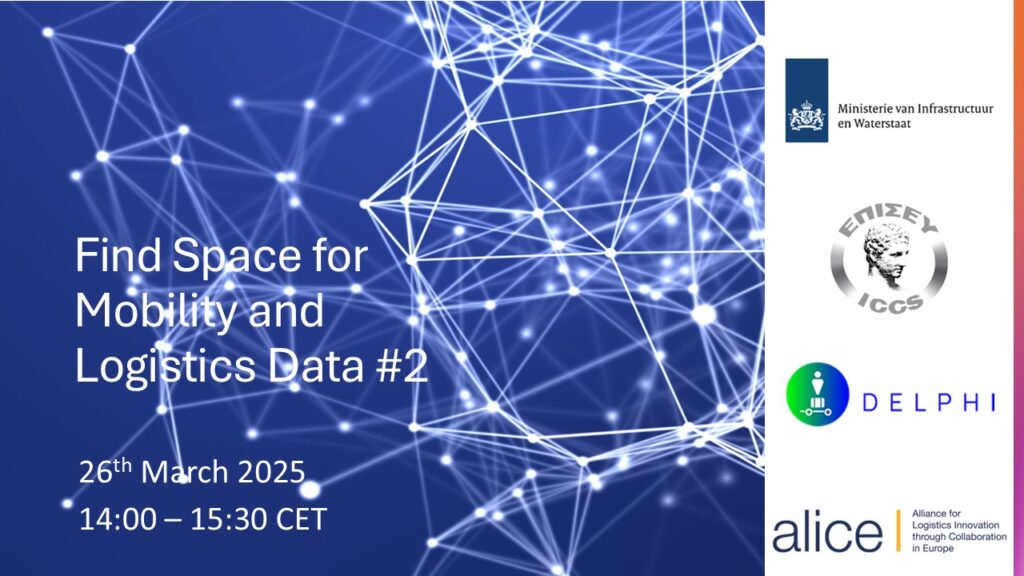Wednesday, April 16th, 2025
On 26 March, ALICE hosted the second episode of its flagship webinar series, “Find Space for Mobility and Logistics Data,” bringing together experts from city administrations, EU-funded projects, and cross-border data initiatives. The event showcased practical implementations of mobility data spaces and explored how emerging frameworks like the European Digital Infrastructure Consortium (EDIC) are paving the way for large-scale, interoperable data exchange across Europe.
This session built on the success of the first webinar and introduced the implementation case in the Horizon Europe project DELPHI as well as a progress update from the EDIC after the webinar held last year.
ALICE’s role in accelerating data-driven logistics
As the recognised European Technology Platform for logistics, ALICE brings together more than 180 organisations—shippers, retailers, logistics service providers, research institutes, and public authorities—working collectively to deliver a zero-emission, efficient, and digitally connected logistics system by 2050.
Through projects like DELPHI, ALICE supports the development and uptake of shared technical standards, pilot’s real-world applications, and enables stakeholder collaboration aligned with the vision of Data Spaces for Logistics & Mobility. See also ALICE’s discussion paper, “A New Level of Data Synchronization for Efficient Logistics Data Exchange.”
Cluj-Napoca Pilot: a real-world data space in action

The first presentation, delivered by Mihai from NTT DATA Romania, showcased the Cluj-Napoca pilot within the DELPHI project. This Romanian city is transforming its fragmented urban mobility data landscape by integrating sources such as bike-sharing stations, air quality sensors, parking systems, and public transport data into a unified Online Analytics Processing Platform.
Developed in collaboration with the city’s IT department, the solution uses Apache Airflow, ClickHouse, and Grafana to automate data collection and visualisation, with data exchanged securely via the Mobility Data Space. A standout feature is the two-way integration with the Waze Partnership Programme, which enables real-time updates on roadworks and traffic conditions.
Cluj-Napoca’s approach exemplifies how cities can modernise public service delivery through interoperable, EU-aligned data governance.
BoostEDIC: from strategy to cross-border implementation
The second presentation, led by Jon Kuiper from the Dutch Ministry of Infrastructure and Water Management (Rijkswaterstaat), introduced BoostEDIC, a €15 million, four-year initiative aimed at implementing the European Digital Infrastructure Consortium (EDIC) for mobility and logistics. Planning to start in the second half of 2025, BoostEDIC will support up to ten cross-border pilot projects. These pilots will be based on a shared technical reference architecture that builds on existing initiatives such as IDSA, Gaia-X, and DeployEMDS. Key participating organizations include Fraunhofer, IMEC, VTT, TNO, AustriaTech, and various national transport ministries.
ALICE is actively engaging its network to prepare for the open pilot calls expected in late 2025, encouraging members to contribute ideas, partnerships, and technical capabilities.
Aligning technology with business value
The webinar concluded with a Q&A discussion on standardisation, semantics, and interoperability moderated by Giannis Kanellopoulos (ALICE’s TG3 Vice Chair and coordinator DELPHI project),highlighting the persistent challenges of legacy systems and sectoral fragmentation. Panellists stressed the importance of focusing not only on architecture and regulation but also on use cases that deliver tangible value for business and society.
As Jon Kuiper noted, successful data spaces must move beyond technical frameworks to enable real-world transformation. ALICE plays a key role here providing a neutral, collaborative environment where innovation aligns with EU sustainability and digitalisation goals.
